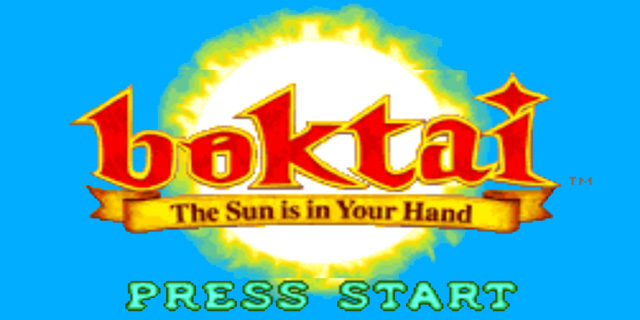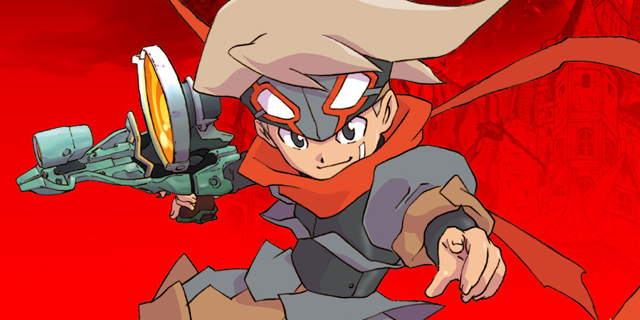
Normally I like to finish a game before I write about it. Not obliterate it to 100% completion or anything, but I at least like to get through the story. Sometimes a game comes along that almost seems to not want me to finish it. Sometimes the difficulty will spike dramatically out of nowhere and require hours of grinding or the sandbox world will open up with no indication of where to go next. I just don’t have time for that. Then there’s a game like Boktai: the Sun is in Your Hand that has a very distinct method of slowing its story to a crawl.
Released in 2003 and produced by Metal Gear Solid creator Hideo Kojima, Boktai is built around a very interesting gimmick. I’m not using gimmick in a derogatory sense, but it certainly is a gimmick. Boktai‘s GBA cartridge contains a solar sensor that absorbs sunlight. The sunlight powers your Gun del Sol and is used to fight enemies like vampires. There are parts of Boktai that can be completed with little to no sunlight, but other sections require some stored or for the player to be playing in direct sunlight. Now I don’t know about you guys, but I’m what you’d call a “shut-in.” When I do make it outside it’s in the dark of night, or I’m actively avoiding the sun. While playing Boktai I found myself actually looking for sunlight, which turned out to be a more difficult mission that I could have imagined.

The problem with this is Boktai forces you to build your daily schedule around finishing sequences of the game. Every boss fight requires you to be in the sun to defeat the enemy. The time window for playing Boktai gets even smaller when you wake up at 1 p.m. and only play when the sunlight happens to be hitting your bedroom window. I couldn’t even get the sensor to work through a bus window. (Granted, it was pretty filthy.) This is exacerbated by the way each boss is structured. Our hero Django has to fight and defeat each boss twice. First, it’s in its normal form with some kind of puzzle element, and second, after dragging it in a coffin all the way back through the dungeon. The coffin is then placed between giant sunlight-emitting machines that need to be constantly powered lest they shut down and the boss escapes. This is also where Django gets his name, just like the classic western in which a character dragged a coffin through the desert.
During the second boss fight you’re constantly powering the solar emitters, fighting off the boss’s attacks and swatting mosquitoes. All while trying to angle the GBA so the cartridge can absorb enough sunlight and you can actually see what’s going on on-screen. I was playing on a GBA SP, which holds the cartridge at the bottom. So I had to hold the console like a tiny laptop with the cart facing upwards and my big meaty claws straining to stay out of the way. Once, a cloud moved in front of the sun for no more than 30 seconds and I was totally screwed. I actually had to go back to where I defeated the boss the first time and drag the coffin all the way back to the beginning of the dungeon for a second time. It’s annoying enough once with Boktai‘s giant, sprawling dungeons that almost resemble a Metroidvania map layout. Several times I found myself turning off the game (or using the merciful sleep function featured in many later GBA games before it was an option built into the console like the DS) until the next day so I could complete a puzzle or defeat a boss. Boktai is not a game one focuses on to beat in a few sittings. (Unless you live in Alaska, where it’s daylight for 30 days.) No, Boktai is a game you should have on the side for when you get bored during a 60-hour RPG or between raids in WoW.
I’m focusing a lot on the negatives of the sun gimmick, but it actually adds more to the game than it subtracts. It was almost distractingly fascinating at first, but didn’t get old once I got used to it. The solar sensor actually had me think about how I’d approach certain parts of the game differently with this weapon and the specific timeframe added an element of urgency to each dungeon. Outside of the solar sensor-related sections, Boktai is a very competent stealth action-RPG. It requires many of the same decisions one makes while playing a Metal Gear Solid, but ammo is even more precious. Solid Snake’s stealth vs. fighting options are usually based on how you like to play a game with each having a similar outcome, but Django is almost forced to be sneaky. If you choose to be an action hero and run out of sun, you’ll be screwed. Django doesn’t know kung fu.
There are also “puzzle” elements, but I use that term loosely. Boktai‘s puzzles are like a dumbed down Resident Evil, consisting mostly of finding keys and pushing blocks. At one point Django’s Navi-esque friend Otenko asked how good I was at arithmetic. Then a room presented the riddle “1 + 1 = ?” It’s 2. The math puzzles got a bit harder, but anyone with a second-grade education would have no trouble with them. Maybe that coupled with the Pokemon-y aesthetic and sunlight gimmick are why this game was overlooked. It’s a shame, really. Gamers clamor for innovation in the industry, but when something unique and well-implemented is introduced, it gets relegated to bargain bins and eBay lots of games based on Dreamworks movies. Boktai also has two sequels, and the third on DS (Lunar Knights) doesn’t even use the solar sensor. It’s five bucks at GameStop and well worth a look. Hey, anything that so ambitiously includes a factor specifically made to stand out from the crowd deserves at least a rental. Open your mind a little, gamers.
Matt Jay’s collection is constantly building, and he’s always up for suggestions. Shoot him an email if you have an idea for something you’d like him to cover.



















